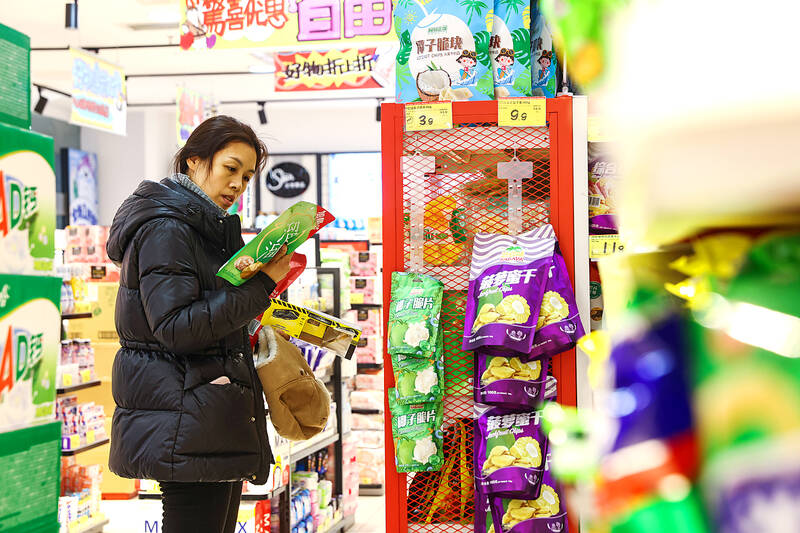China narrowly avoided slipping into deflation last month with prices rising at their slowest pace in nine months, official figures showed Thursday, as Beijing struggles to kickstart consumer activity in the world’s No. 2 economy.
The tepid reading comes after the government unveiled a range of measures at the end of last year aimed at boosting consumption as well as providing support for the troubled property sector, including interest rate cuts.
However, data showed that has not yet filtered through, with growth in the consumer price index (CPI), a key measure of inflation, easing to 0.1 percent last month, from 0.2 percent in November, according to the Chinese National Bureau of Statistics. The reading is the lowest since March.

Photo: EPA-EFE
A survey of economists had forecast 0.1 percent.
However, core CPI — which excludes volatile food and fuel prices — picked up for a third month to 0.4 percent from a year ago, reaching the highest level since July last year, the bureau said.
For the whole of last year, prices were up 0.2 percent, the same as the previous year.
Sluggish spending — combined with persistent woes in the property sector and local government financing strains — has cast doubt on the feasibility of official growth targets.
China emerged from a four-month period of deflation in February last year, a month after suffering the sharpest fall in prices for 14 years.
While deflation suggests the cost of goods is falling, it poses a threat to the broader economy as consumers tend to postpone purchases under such conditions, hoping for further reductions.
A lack of demand could then force companies to cut production, freeze hiring or lay off workers, while potentially also having to discount existing stocks — dampening profitability even as costs remain the same.
The latest data showed that factory deflation extended into a 27th month last month, though the producer price index recorded a slower drop of 2.3 percent, according to the bureau.
“Recent economic data stabilized but the momentum is not strong enough to generate upward pressure on consumer prices yet,” Pinpoint Asset Management chief economist Zhang Zhiwei (張智威) said in a note.
“The deflationary pressure is persistent,” he said.
Low inflation might lead to an increase of real interest rates, the Economist Intelligence Unit principal economist Yue Su (蘇月) said.
“So monetary easing policy needs to be more proactive to really reduce the borrowing cost of enterprises, which is important for a broad recovery of the economy,” she said.

CHIP RACE: Three years of overbroad export controls drove foreign competitors to pursue their own AI chips, and ‘cost US taxpayers billions of dollars,’ Nvidia said China has figured out the US strategy for allowing it to buy Nvidia Corp’s H200s and is rejecting the artificial intelligence (AI) chip in favor of domestically developed semiconductors, White House AI adviser David Sacks said, citing news reports. US President Donald Trump on Monday said that he would allow shipments of Nvidia’s H200 chips to China, part of an administration effort backed by Sacks to challenge Chinese tech champions such as Huawei Technologies Co (華為) by bringing US competition to their home market. On Friday, Sacks signaled that he was uncertain about whether that approach would work. “They’re rejecting our chips,” Sacks

NATIONAL SECURITY: Intel’s testing of ACM tools despite US government control ‘highlights egregious gaps in US technology protection policies,’ a former official said Chipmaker Intel Corp has tested chipmaking tools this year from a toolmaker with deep roots in China and two overseas units that were targeted by US sanctions, according to two sources with direct knowledge of the matter. Intel, which fended off calls for its CEO’s resignation from US President Donald Trump in August over his alleged ties to China, got the tools from ACM Research Inc, a Fremont, California-based producer of chipmaking equipment. Two of ACM’s units, based in Shanghai and South Korea, were among a number of firms barred last year from receiving US technology over claims they have

It is challenging to build infrastructure in much of Europe. Constrained budgets and polarized politics tend to undermine long-term projects, forcing officials to react to emergencies rather than plan for the future. Not in Austria. Today, the country is to officially open its Koralmbahn tunnel, the 5.9 billion euro (US$6.9 billion) centerpiece of a groundbreaking new railway that will eventually run from Poland’s Baltic coast to the Adriatic Sea, transforming travel within Austria and positioning the Alpine nation at the forefront of logistics in Europe. “It is Austria’s biggest socio-economic experiment in over a century,” said Eric Kirschner, an economist at Graz-based Joanneum

OPTION: Uber said it could provide higher pay for batch trips, if incentives for batching is not removed entirely, as the latter would force it to pass on the costs to consumers Uber Technologies Inc yesterday warned that proposed restrictions on batching orders and minimum wages could prompt a NT$20 delivery fee increase in Taiwan, as lower efficiency would drive up costs. Uber CEO Dara Khosrowshahi made the remarks yesterday during his visit to Taiwan. He is on a multileg trip to the region, which includes stops in South Korea and Japan. His visit coincided the release last month of the Ministry of Labor’s draft bill on the delivery sector, which aims to safeguard delivery workers’ rights and improve their welfare. The ministry set the minimum pay for local food delivery drivers at